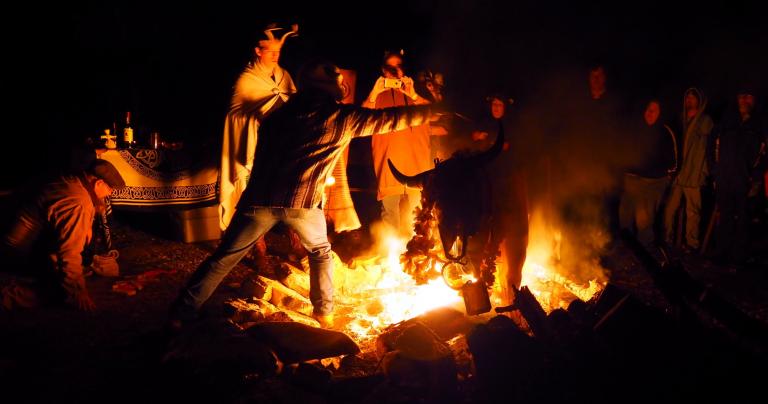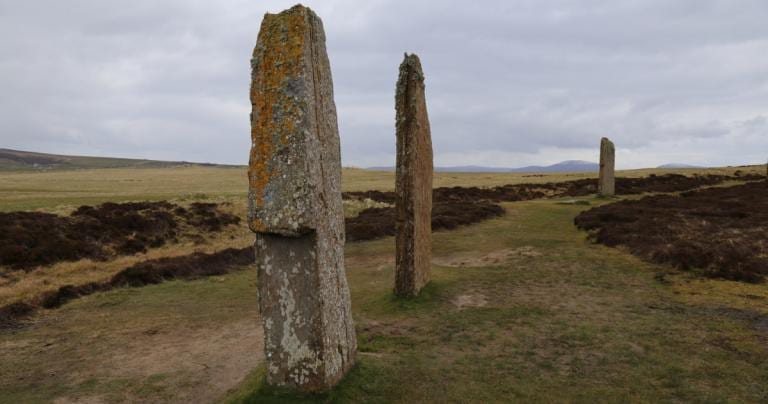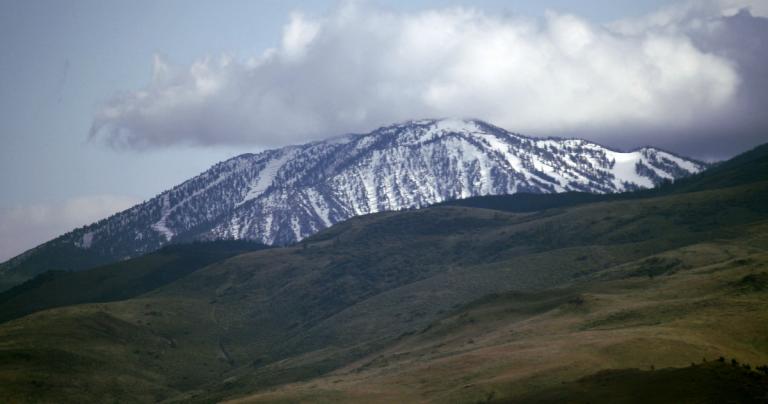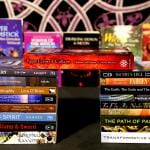As I was working on the review of Ascendant – and especially as I was reading through all the commentary on the ancient Greeks – it occurred to me that one of the reasons we have such little contemporary polytheist theology is that most of us don’t know where to begin. The theological methods of the monotheists are of limited value to us. Platonism and Neoplatonism are helpful, but they’re not always the best fit for those of us whose polytheism is rooted in practices from other lands and cultures.
Then I read Morgan Daimler’s recent post here on Patheos titled Fairies, Tradition & Popculture. Morgan makes an important distinction between beliefs rooted in lore (which are based on someone’s experience) and beliefs based on fiction. Fiction is made up from imagination – it has no external reality. But while experiences can be misinterpreted, they have at least some roots in fact – often many roots. Experiences are a starting point.
We can begin rebuilding polytheist theology from our own experiences. What a theology of personal experience can tell us will necessarily be basic and possibly even simplistic. But it’s a place to start.
Theology requires context
Theology – thinking about the Gods – can never be done in a vacuum. It requires a container, a structure of foundational assumptions about the universe and the way it works.
A polytheist, a monotheist, and an atheist can stand side by side and experience the same phenomena: the same sights and sounds, they can even feel the same emotions. They will interpret their experiences in radically different ways because of their different assumptions about the nature of the universe.
My foundational assumptions begin with animism: the idea that everything is not a thing but a person, that whatever animates you and me also animates the birds and squirrels, the wind and trees, and even the rivers and mountains. I’m not ready to declare that consciousness is fundamental, but I am sure that consciousness is more than the product of brain activity.
Foundational assumptions are how we build metaphysics – a working model of how the world works.
Philosophy (literally “the love of wisdom”) also helps build a container for theology. The relationship between philosophy and theology is beyond the scope of this post (and honestly, beyond the current limits of my own wisdom). Growing up I was taught that philosophy was inferior to theology, in every sense of the term. For now, simply understand that idea is wrong. A fully formed theology will include philosophy, some as context and some as the product of our theological thinking.
Once we have our container, we can begin drawing theological conclusions from our experiences.
Gods are the mightiest of spirits
Thinking about the Gods necessarily begins with the question “what is a God, anyway?” The best answer I have is that a God is the mightiest of spirits.
All living things have spirits… though it may be better to say that all living things are spirits, and some spirits have bodies. And while all spirits may be of equal value, they are not identical. The spirit of an oak tree is not the same as the spirit of a dolphin. I see these spirits as existing on a wide continuum, with more than a little overlap between categories. For example, ancestors are human spirits but some of them are also Gods.
Gods are simply those spirits who exist on the far end of this spectrum. Where “God” ends and “not-God” begins is another question for another day.
Some of our ancestors spoke of the Gods as having physical forms. I take those stories at face value, but I have never seen a God in bodily form… though given the state of affairs in our world, I wouldn’t be shocked if someday I did. For now, I’m working on the assumption that we encounter the Gods only as spirits.
When I’ve used this definition before I’ve had a few people object. They say that that calling the Gods the mightiest of spirits implies that might makes right. That’s not what I’m saying – far from it. The Gods are virtuous because They live virtuously – it can be said that They embody Their virtues perfectly. Virtues are emergent: they flow from the interactions of persons, human and otherwise. Virtues are not simply “what a particular God wants.” Might does not make right.
But if this definition bothers you, simply replace “mightiest” with “greatest” or “most capable” or “most perfect.”
The Gods are many
This was my first experience-based theological observation.
Before Denton CUUPS performed our first Egyptian Summer Solstice ritual in 2004, we spent nine nights in meditation – one with each of the Gods of the Ennead. I found that my experience of Isis was different from my experience of Osiris, and both were different from my experience of Set. If I experienced the Gods as individuals, it seemed proper to conceive of Them as individuals and relate to Them as individuals, even though I could never be sure.
In A Million and One Gods – the Persistence of Polytheism, author Page duBois points out that polytheism as a concept is only necessary in a monotheistic culture. Without monotheism, people simply worship their Gods. She quotes Jordan Paper, who said “Polytheists would have no more reason to call themselves such than they would to call themselves ‘air breathers’ or ‘bipedal’.”
Christians and Muslims fight a constant battle to keep their followers from acknowledging the existence of many Gods. They must, because polytheism is intuitive. We hear ordinary people talking about “the weather Gods” or “the Gods of baseball” in an off-hand way. Without constant reinforcement, those casual comments about many Gods will turn into the worship of many Gods.
It’s not just me. The vast majority of human religious experience supports the idea that the Gods are many, not one.
The Gods have agency and will
Polytheism may be intuitive, but for the last 1600 years or so Christians and then Muslims and now atheists have been telling everyone it’s “primitive.” So those who feel the call of the many Gods are sometimes reluctant to accept Their reality. They claim the Gods are metaphors or archetypes or aspects of our higher selves. We had a big argument over that in 2015. I’m sorry so many people got upset, but I’m glad we drew some boundaries that needed to be drawn.
Begin to work with a deity and before too long you’ll start to notice They tell you things you would otherwise not know – or would rather not hear. They tell you to do things you’d rather not do. And you start to notice Them moving in this world completely independent of the metaphors and archetypes in your head.
The theology of personal experience tells us the Gods have agency – They have the ability to do Their own things independent of humans. They have will – They choose what to do and how to do it for Their own reasons, reasons that are usually anything but transparent to us.
And sometimes Their agency and will bring them into close contact with us.
The Gods form relationships with other persons
Whatever else They may be, the Gods are persons. And one of the attributes of persons is that they form relationships with other persons. In this respect the Gods are no different from the rest of us.
In his essay in Ascendant, Edward Butler pointed out that in antiquity Gods were less often engaged as deities of a function (Storm God, Fertility Goddess, etc.) and more frequently engaged as deities of a place or of a people. The Olympians formed relationships with the people of Greece, the Neteru formed relationships with the people of Egypt… and when those people moved, their Gods moved with them.
In our time we see Gods forming relationships with individual humans. I have oathed relationships with three deities, and less formal relationships with several others. That wasn’t unheard of in ancient times, but it was far from the norm. Is this because if the Gods want relationships today they can only form them with individuals and not with nations? Perhaps – perhaps not. The theology of my personal experience doesn’t go that deep.
What is that deep is the need for our relationships to be respectful and reciprocal. The Gods are not vending machines to give us stuff, nor are they spare tires for us to ignore until we have an emergency. They are persons to whom we give so that we may receive, that we may give again.

Theology is an on-going community project
Mention theology and people start throwing out names of famous Christian theologians: Origen and Augustine, Thomas Aquinas and Julian of Norwich, Karl Barth and Paul Tillich. That leaves many of us with the idea that theology is something done by brilliant people working alone. This is not a helpful concept.
Theology is a never-ending project of a religious movement. One person thinks about the Gods and then writes about their thoughts. Other people read their theology and affirm some parts of it, while rebutting other parts. More importantly, they dive deeper into this area or that.
And our polytheist theology grows.
The true nature of the Gods is a mystery, and intellectual knowledge about the Gods is no substitute for first-hand experience of the Gods. But from those experiences, and through our intellectual discourse, we can learn something about the Gods. And that helps us to build robust polytheist religions for our time.
May our conversations about the Gods be wise and true!

















